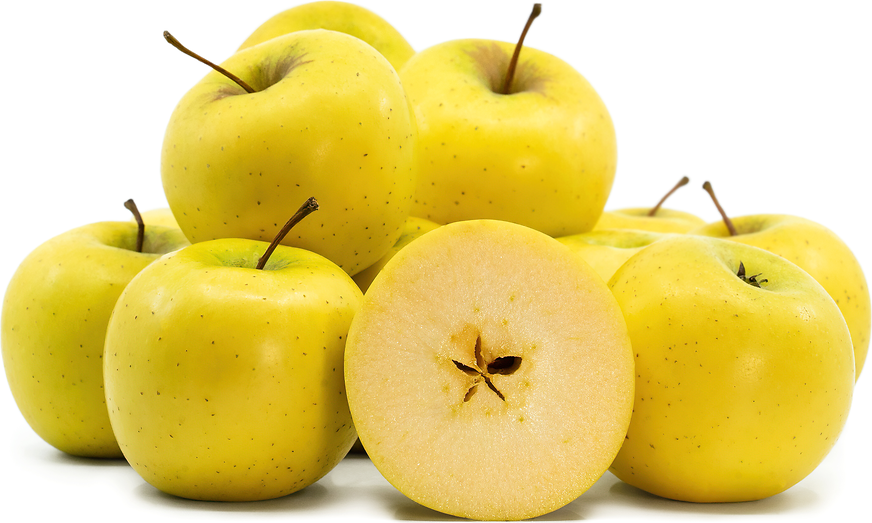


Lubee® Apples
Estimated Inventory, lb : 0
Description/Taste
Lubee® apples are medium-sized varietal, averaging 7 to 7.5 centimeters in diameter, and have a round, oblate, to oval shape. The variety is typically harvested when it is 165 grams in weight and has a thin, slender, and elongated dark brown stem connected to the fruit in a lightly russeted cavity. Lubee® apples are known for their golden yellow coloring when ripe and have thin, smooth, taut, and slightly waxy skin with a faint sheen. There are also prominent dark brown lenticels, varying in size, scattered across the surface. Underneath the skin, the yellow flesh is firm, crunchy, chewy, dense, and juicy but drier in texture than other commercial varieties. The flesh also encases a central fibrous cavity filled with tiny black-brown seeds. Lubee® apples are edible raw when ripe and release an aromatic, fruity scent. The flesh has a high sugar content, reaching 16 to 18 degrees Brix, giving the fruits a sweet, subtly acidic, floral, and fruity taste with tropical nuances.
Seasons/Availability
Lubee® apples are harvested in the fall.
Current Facts
Lubee® apples, botanically classified as Malus domestica, are a French variety belonging to the Rosaceae family. The golden yellow cultivar was bred in the late 19th century and is exclusively sold and marketed by the Innatis Group in France. Lubee® apples are an organic variety promoted for their rustic appearance combined with a modern, sweet, and tropical flavor catered to younger consumers. The variety is easy to grow, productive, and resistant to diseases such as scab and powdery mildew. Lubee® apples are typically harvested 7 to 10 days after Golden Delicious and have extended storage properties, a valued trait for organic apples. The variety is considered a specialty apple sold commercially as a fresh-eating cultivar.
Nutritional Value
Lubee® apples have not been extensively studied for their nutritional properties. Like other commercial yellow apples, the variety is a source of potassium to balance fluid levels within the body, calcium to build strong bones and teeth, fiber to regulate the digestive tract, and vitamin C to strengthen the immune system. Apples also provide small amounts of copper to develop connective tissues, vitamin E to protect the cells against free radical damage, iron to produce the protein hemoglobin for oxygen transport through the bloodstream, magnesium to control optimal nerve functioning, and other nutrients, including iron, vitamin K, manganese, and zinc.
Applications
Lubee® apples have a sweet, subtly tart taste suited for fresh preparations. The variety is customarily eaten straight out of hand and is often sliced and served on cheese boards. Lubee® apples are also sliced and layered into sandwiches, thinly cut and incorporated into fresh spring rolls or used as a topping over parfaits, grain bowls, and salads. The apples are mixed into fruit medleys, pureed and frozen into sorbet and granita, or blended into smoothies and shakes. Try slicing Lubee® apples as a simple snack or consuming the fruits with dips such as nut butter, caramel, or chocolate as a sweet treat. While less common, Lubee® apples are sometimes simmered into jams, jellies, preserves, and syrups. They can also be cooked into sauces and served with roasted meats. In addition to preserves, Lubee® apples are sometimes baked into tarts, crisps, galettes, and crumbles. The apples can also be dried into rings and strips for extended use. Lubee® apples pair well with nuts such as walnuts, almonds, pine, and peanuts, herbs such as mint, basil, sage, and rosemary, cheeses including feta, brie, parmesan, and goat, vanilla, chocolate, maple syrup, honey, and brown sugar. Whole, unwashed Lubee® apples will keep for several days to weeks when stored in a cool, dry, or dark place such as a cellar or the refrigerator’s crisper drawer.
Ethnic/Cultural Info
Lubee® apples were initially named Gradictive when first developed through orchards at Gradilis in France. Gradictive is rumored to have been a combination of the company’s name, Gradilis, and the word addictive, a descriptor given to the variety for its distinct, appealing flavor. Gradilis, a French apple breeder and nursery, is notably known for having created a new method of apple cultivation that they have labeled and patented as YPSILON®. This technique involves placing two grafts on a single rootstock, creating a double-axis branched tree. YPSILON® is thought to improve performance and efficiency in orchards, and Gradilis is hopeful this grafting method is the future of apple orchards for increased production.
Geography/History
Lubee® apples are native to France and were developed by Gradilis Recherche, a program under the overarching Gradilis brand. It took over 20 years to develop the variety, and the apples were initially called Gradictive when they were first created. Gradictive apples were made through hybridization, and after their establishment as a new variety, over five years were spent constructing a marketing and sales strategy. In the early 21st century, Gradictive apples were rebranded under the commercial name Lubee® and were officially released and marketed through the Innatis Group at Fruit Attraction in 2021 in Madrid, Spain. Since their release, Lubee® apples have been exclusively grown in France and are sold as an organic apple variety, along with Juliet®, Honeycrunch®, Choupette® Organic, and LoliPop® Organic apples under Innatis. Today, Lubee® apples are certified organic by the French Organic Agriculture and the European Union label and are grown without the use of synthetic chemicals. When in season, Lubee® apples are sold through select retailers and distributors in Europe.








